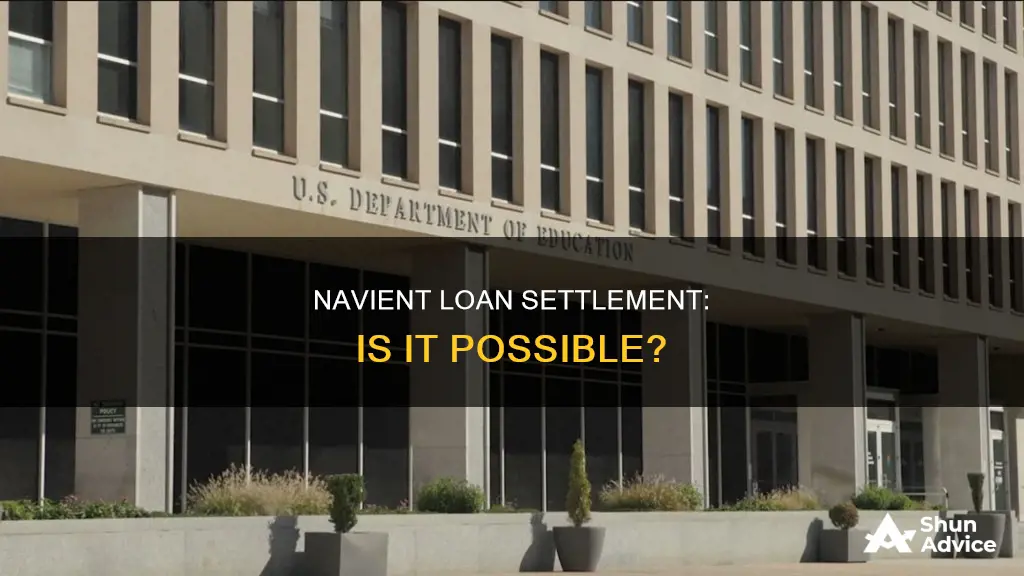
Navient, formerly known as Sallie Mae, has been involved in several lawsuits and settlements related to its student loan practices. The company has faced allegations of misleading borrowers, processing payments incorrectly, and offering expensive forbearance plans instead of more flexible, income-driven repayment options. In 2024, the Consumer Financial Protection Bureau (CFPB) banned Navient from servicing federal student loans and ordered the company to pay $120 million in settlements. Additionally, in 2022, Navient reached a $1.85 billion settlement with 39 state attorneys general, agreeing to cancel $1.7 billion in student loan debts for approximately 66,000 borrowers. While these settlements provide relief to some borrowers, they also highlight the ongoing challenges and complexities surrounding student loan debt in the United States.
| Characteristics | Values |
|---|---|
| Navient's settlement amount | $1.85 billion |
| Number of states involved in the settlement | 39 |
| Number of borrowers who will benefit from the settlement | 66,000 |
| Eligibility criteria | Borrowers who took out private student loans through Sallie Mae from 2002 to 2010 to attend certain for-profit schools and defaulted on these loans before June 30, 2021, and live in one of the 38 states (plus Washington, D.C.) that are part of the lawsuit |
| Navient's predecessor | Sallie Mae |
| Navient's headquarters | Herndon, Virginia |
| Navient's status | Banned from servicing federal student loans |
| Navient's settlement payment breakdown | $100 million in redress for affected consumers and a $20 million penalty into the CFPB's victims relief fund |
| Navient's response to the settlement | Navient does not agree with the CFPB's allegations but called the settlement an "important positive milestone" in the company's transformation |
What You'll Learn

Navient's $1.85 billion settlement
Navient, formerly known as Sallie Mae, has been involved in a series of lawsuits and settlements due to its abusive and misleading practices in the student loan industry. In 2024, the Consumer Financial Protection Bureau (CFPB) banned Navient from federal student loan servicing and ordered the company to pay $120 million for its failures and lawbreaking. This settlement addressed Navient's misleading and incorrect processing of student loan payments, as well as violations of the Consumer Financial Protection Act, the Fair Credit Reporting Act, and the Fair Debt Collection Practices Act.
In addition to the $120 million settlement, Navient reached a separate agreement in 2022 with 39 state attorneys general, resulting in a $1.85 billion settlement. This settlement addressed the company's predatory student loan practices and forbearance steering, where they misled borrowers about income-driven repayment plans. As part of this $1.85 billion agreement, Navient will cancel approximately $1.7 billion in private student loan balances for nearly 66,000 borrowers. Additionally, $95 million in restitution payments will be distributed to around 350,000 federal loan borrowers who were affected by the company's forbearance steering practices.
The $1.85 billion settlement is a significant milestone, as it holds Navient accountable for its abusive and deceptive practices. It also provides much-needed relief to thousands of borrowers who have struggled with the financial burden of student loans. This agreement is a step towards ensuring that student loan servicers operate with transparency and integrity, putting an end to the years of abuse and exploitation of students and taxpayers.
While the financial relief offered by the settlement is crucial, it is also worth noting that the agreement includes conduct reforms for Navient. These reforms aim to prevent future instances of misleading and abusive practices. Navient is now required to explain the benefits of income-driven repayment plans and offer estimates of income-driven payment amounts before placing borrowers into optional forbearances. Additionally, the company must train specialists to advise distressed borrowers on alternative repayment options and counsel public service workers on Public Service Loan Forgiveness (PSLF) programs. These conduct reforms are designed to empower borrowers with knowledge and support to make informed decisions about their loan repayment options.
The $1.85 billion settlement between Navient and 39 state attorneys general is a landmark agreement that addresses widespread unfair and abusive student loan servicing practices. By holding Navient accountable, the settlement provides financial relief to affected borrowers and promotes much-needed changes in the student loan industry.
Budgeting for Loans: Strategies for Financial Success
You may want to see also

Navient's ban from federal student loan servicing
Navient, formerly known as Sallie Mae, has been banned from federal student loan servicing by the Consumer Financial Protection Bureau (CFPB). The company has been accused of a wide range of lending failures, including illegally overcharging nearly 78,000 servicemembers, resulting in a $100 million settlement in 2014. In 2021, the Department of Education ordered Navient to return more than $22 million in overcharges, and in 2022, the company settled with 39 state attorneys general, agreeing to cancel $1.7 billion in student loan debts.
The CFPB's order bans Navient from most federal student loan activities, including servicing federal Direct Loans and acquiring Federal Family Education Loan Program loans. The company is also banned from conducting consumer-facing servicing activities for the Federal Family Education Loan Program. The order requires Navient to take steps to protect borrowers' rights, including the right to enroll in more affordable repayment plans.
Navient has agreed to pay $120 million in restitution and penalties, with $100 million going to affected borrowers and $20 million to the CFPB's victim relief fund. This settlement brings an end to one of the longest-running federal enforcement actions against a major financial firm in U.S. history.
Navient, once the largest student loan servicer in the United States, serviced more than $300 billion in federal and private student loans for more than 12 million borrowers. The company has been accused of misleading borrowers, processing payments incorrectly, and violating various laws, including the Consumer Financial Protection Act, the Fair Credit Reporting Act, and the Fair Debt Collection Practices Act.
The ban on Navient from federal student loan servicing is intended to protect students and taxpayers from abuse and ensure fairer treatment for student loan borrowers.
Homeowner Insurance: Loan Price Coverage Explained
You may want to see also

Navient's $120 million settlement
Navient, formerly known as Sallie Mae, has agreed to pay $120 million as part of a settlement agreement with the Consumer Financial Protection Bureau (CFPB). The settlement closes the loop on a 2017 lawsuit filed by the bureau, which claimed that the Virginia-based company misled student loan borrowers and processed their payments incorrectly.
The CFPB's lawsuit alleged that Navient, which was once the largest student loan servicer in the United States, violated the Consumer Financial Protection Act, the Fair Credit Reporting Act, and the Fair Debt Collection Practices Act. The company was also accused of misleading borrowers about income-driven repayment plans and forcing them to pay more than they should have.
As part of the settlement, Navient will be required to pay $100 million in redress to impacted borrowers and a $20 million penalty to the CFPB's victims' relief fund. The company has also been banned from servicing federal student loans and conducting consumer-facing servicing activities for the Federal Family Education Loan Program.
Navient has denied any wrongdoing and stated that the agreement puts "these decade-old issues behind us." However, this settlement is not the first time the company has faced legal penalties. In 2022, Navient settled with 39 state attorneys general and agreed to cancel $1.7 billion in student loan debts owed by roughly 66,000 borrowers. The company has also faced allegations of steering students into costly forbearance options and offering subprime private loans to vulnerable borrowers.
Notarization of Family Loan Agreements: Is It Necessary?
You may want to see also

Navient's history of regulatory violations
Navient, formerly known as Sallie Mae, has a long history of regulatory violations. In 2014, the Department of Justice and the Federal Deposit Insurance Corporation ordered Navient to pay almost $100 million for illegally overcharging nearly 78,000 servicemembers. In 2021, the Department of Education ordered the company to return more than $22 million in overcharges.
In 2022, 39 state attorneys general announced a $1.85 billion settlement with Navient for predatory lending practices and forbearance steering. The company was accused of steering student borrowers into expensive forbearance options instead of more flexible, income-driven repayment plans. Additionally, Navient faced allegations that its former owner, Sallie Mae, had made subprime private loans to vulnerable borrowers who were likely to default.
Navient has also been accused of violating the Consumer Financial Protection Act, the Fair Credit Reporting Act, and the Fair Debt Collection Practices Act. The Consumer Financial Protection Bureau (CFPB) filed a proposed order against Navient for its years of failures and lawbreaking, which resulted in a ban from servicing federal Direct Loans and most loans under the Federal Family Education Loan Program. The CFPB's order also requires Navient to take steps to protect borrowers' rights, including the right to enroll in more affordable repayment plans.
In addition to the financial penalties, the CFPB's order is intended to prevent Navient from harming federal student loan borrowers in the future. The company has also settled a $2.5 million TCPA lawsuit, although it denied all allegations of wrongdoing.
Navient's Private Loan Services: What You Need to Know
You may want to see also

Navient's $100 million redress to consumers
Navient, formerly known as Sallie Mae, has been accused of multiple unethical practices and misleading student loan borrowers. The Consumer Financial Protection Bureau (CFPB) filed a proposed order against Navient for its years of failures and lawbreaking. The company has been banned from servicing federal student loans and has been ordered to pay $120 million in compensation, of which $20 million is a penalty and $100 million is redress to consumers.
The $100 million in compensation aims to address the harm caused by Navient's practices. The company has been accused of failing borrowers at every stage of repayment and misleading them about income-driven repayment plans. The CFPB has indicated that it will determine who is eligible for compensation and will send out payments accordingly. Borrowers will not have to take any direct action to receive the redress.
Navient has consistently denied the allegations brought by the CFPB, stating that the agreement puts "these decade-old issues behind us". The company has also mentioned that it does not agree with the allegations but that the resolution is consistent with its go-forward activities and is a positive milestone in its transformation.
The settlement is a result of years of litigation between the CFPB and Navient, which was once one of the country's largest student loan servicers. The CFPB accused Navient of engaging in multiple forms of misconduct, including illegally overcharging nearly 78,000 servicemembers and steering student borrowers into expensive forbearance options instead of more flexible, income-driven repayment plans.
Michigan's Dual Loan Policy: Is It Allowed?
You may want to see also
Frequently asked questions
In 2024, Navient reached a $120 million settlement with the Consumer Financial Protection Bureau (CFPB) for misleading student loan borrowers. Navient was banned from servicing federal student loans.
Navient was accused of pushing borrowers to apply for student loan forbearance, which allowed them to postpone payments but still charged them interest. Navient also misled borrowers about income-driven repayment plans and processed their payments incorrectly.
The CFPB has not specified who will qualify for the consumer redress. However, borrowers who were serviced by Navient, including when it was known as Sallie Mae, may qualify for relief.
Federal loan borrowers who are eligible for forbearance steering restitution will be notified by the settlement administrator. Private loan borrowers who are eligible for loan cancellation will be notified by Navient.







